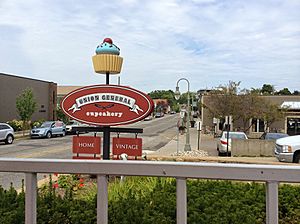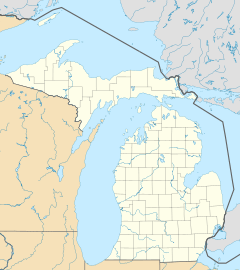Clarkston Village Historic District facts for kids
Quick facts for kids
Village of Clarkston, Michigan
|
|
|---|---|
|
City
|
|
 |
|
| Country | United States |
| State | Michigan |
| County | Oakland |
| Township | Independence |
|
Clarkston Village Historic District
|
|
| NRHP reference No. | 80001884 |
| Significant dates | |
| Added to NRHP | May 15, 1980 |
The Village of Clarkston is a cool historic place in the southern part of Independence Township, Michigan. You can find it right along M-15.
Clarkston is special because it's been named a Michigan State Historic Site. This happened on January 16, 1976. It was also added to the National Register of Historic Places on May 15, 1979. This means it's an important place to protect!
The Clarkston Village Historic District covers many streets. These include Buffalo Street, Church Street, Clarkston Road, Depot Road, Holcomb Street, Main Street (which is also M-15), Miller Road, Waldon Road, and Washington Street. There are more than 100 historic buildings in this area.
Contents
Cool Old Buildings: Clarkston's Architecture
Clarkston was chosen as a historic site because of its amazing buildings and long history. When you visit, you'll see many homes built in the beautiful Queen Anne style architecture.
Different House Styles in Clarkston
Besides Queen Anne, you can spot many other types of houses. These include Bungalows, Colonial Revival homes, and even Empire designs. You'll also find Gothic Revival, Greek Revival, and Mansard roofs. Some homes are in the Stick Style or Tudor Revival style. Many older homes also show Vernacular architecture, which means they were built using local traditions and materials.
Clarkston's Early Days: A Look at Its History
The story of Clarkston began a long time ago, in 1823. The Williams family was the first to buy land here. By 1831, pioneers like Linus Jacox and Butler Holcomb started building their homes. Soon, more settlers arrived from New York and New Jersey.
How Clarkston Got Its Name
Jeremiah Clark came to the area in 1832. His brother, Nelson, followed and built his home in 1839. This house is still standing today at 71 N. Main Street! The Clark brothers were busy. They built a sawmill and a gristmill (for grinding grain). They also started a fish hatchery and opened a general store. In 1840, they planned out the village. Just two years later, in 1842, the grateful settlers voted to name the village "Clarkston" after them.
Growing Up: Clarkston's Development
By 1877, the Clarkston area was really growing. Nearly 1,400 people lived there. Farms and businesses were doing well.
What Clarkston Had in 1877
The village had many different stores. You could find furniture, clothing, and jewelry shops. There were also hotels, wagon makers, and people who made harnesses for horses. You could also find liveries (places to keep horses) and three physicians (doctors).
Schools and Churches
The very first school in Clarkston was Sashabaw School. It was built in 1834 at the corner of Maybee Road and Pine Knob Road. Later, the Union School was built in 1840 right in the middle of the village. Clarkston's first church was the Methodist Episcopal Church on Buffalo Street. It was finished in 1847.
Big Changes: Clarkston's Transformation
Clarkston saw many changes over the years. The arrival of the railroad in 1851 brought new visitors.
Tourism and Entertainment
Tourists from Detroit and Pontiac discovered Clarkston's beautiful lakes, farms, and woodlands. Soon, hotels like the Demarest House and Deer Lake Inn were built for all the summer visitors. An opera house on the top floor of the downtown Maccabees Building kept everyone entertained.
The Age of Automobiles
The biggest change came with the invention of the automobile. Old Native American trails were paved and widened to make way for cars. The Saginaw Trail, now called Dixie Highway, was paved as early as 1920. Main Street (M-15) was paved around 1922.
Modern Growth and Development
The expanding national highway system brought I-75 through the Clarkston area in 1962. This led to more businesses and homes being built. Many farms turned into new neighborhoods and shopping areas. Clarkston kept growing and became a northern suburb of Detroit.
 | Kyle Baker |
 | Joseph Yoakum |
 | Laura Wheeler Waring |
 | Henry Ossawa Tanner |


